国际贸易中代理合同(ICC)
- 格式:doc
- 大小:77.00 KB
- 文档页数:19
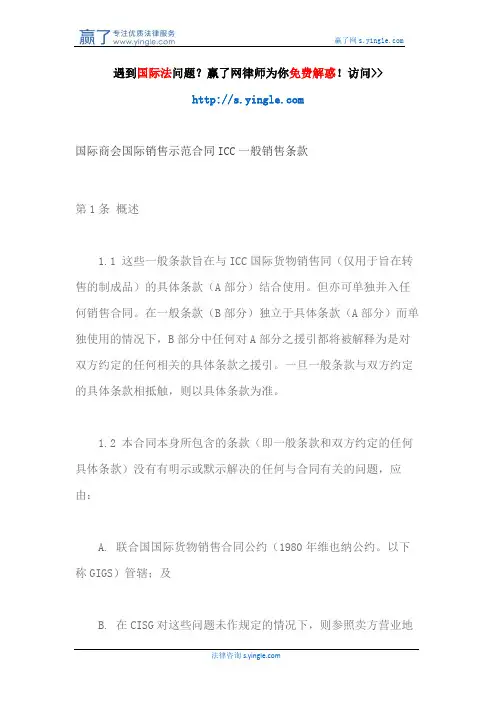
遇到国际法问题?赢了网律师为你免费解惑!访问>>国际商会国际销售示范合同ICC一般销售条款第1条概述1.1 这些一般条款旨在与ICC国际货物销售同(仅用于旨在转售的制成品)的具体条款(A部分)结合使用。
但亦可单独并入任何销售合同。
在一般条款(B部分)独立于具体条款(A部分)而单独使用的情况下,B部分中任何对A部分之援引都将被解释为是对双方约定的任何相关的具体条款之援引。
一旦一般条款与双方约定的具体条款相抵触,则以具体条款为准。
1.2 本合同本身所包含的条款(即一般条款和双方约定的任何具体条款)没有有明示或默示解决的任何与合同有关的问题,应由:A. 联合国国际货物销售合同公约(1980年维也纳公约。
以下称GIGS)管辖;及B. 在CISG对这些问题未作规定的情况下,则参照卖方营业地所在国的法律来处理。
1.3任问对贸易术语(如EXW、FCA等)之援引都视为是对国际商会出版的INCOTERMS的相关术语之援引。
1.4任何对国际商会出版物之援引都视为是对合同成立时的现行版本之援引。
1. 5除非书面约定或证明,任何对合同的修改都是无效的。
但,若一方当人的行为已为另一万当事人信赖,那么,就此而言,该方当事人就不得主张此项规定。
第2条货物特征2.1双方约定,除非合同明确提及,卖方所提供的商品目录、说明书、传单、广告、图示、价目表中包含的任何有关货物及其用途的信息,如重量、大小、容量、价格、颜色以及其他数据,都不得作为合同条款而生效。
2.2除非另有约定,尽管买方有可能得到软件、图纸等、但他并未因此而获得它们的产权。
卖方仍是与货物有关的知识产权或工业产权的唯一所有者。
第3条货物在装运前的检验若双方已约定买方有权在装运前检验货物,则卖方必须在装运前一个合理时间内通知买方货物已在约定地点备妥待验。
第4条价格4.1如果没有约定价格,则应采用合同成立时卖方现行价目表上所列价格。
若无此价格,则应采用合同成立时此类货物的一般定价。
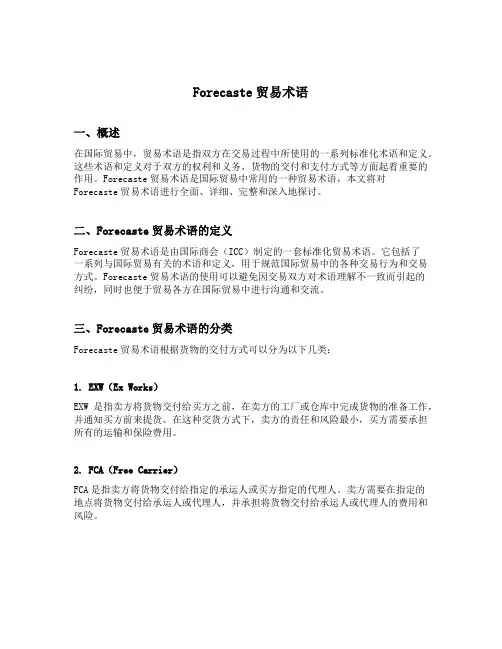
Forecaste贸易术语一、概述在国际贸易中,贸易术语是指双方在交易过程中所使用的一系列标准化术语和定义。
这些术语和定义对于双方的权利和义务、货物的交付和支付方式等方面起着重要的作用。
Forecaste贸易术语是国际贸易中常用的一种贸易术语,本文将对Forecaste贸易术语进行全面、详细、完整和深入地探讨。
二、Forecaste贸易术语的定义Forecaste贸易术语是由国际商会(ICC)制定的一套标准化贸易术语。
它包括了一系列与国际贸易有关的术语和定义,用于规范国际贸易中的各种交易行为和交易方式。
Forecaste贸易术语的使用可以避免因交易双方对术语理解不一致而引起的纠纷,同时也便于贸易各方在国际贸易中进行沟通和交流。
三、Forecaste贸易术语的分类Forecaste贸易术语根据货物的交付方式可以分为以下几类:1. EXW(Ex Works)EXW是指卖方将货物交付给买方之前,在卖方的工厂或仓库中完成货物的准备工作,并通知买方前来提货。
在这种交货方式下,卖方的责任和风险最小,买方需要承担所有的运输和保险费用。
2. FCA(Free Carrier)FCA是指卖方将货物交付给指定的承运人或买方指定的代理人。
卖方需要在指定的地点将货物交付给承运人或代理人,并承担将货物交付给承运人或代理人的费用和风险。
3. CPT(Carriage Paid To)CPT是指卖方在将货物交付给承运人之前,负责将货物运输到指定的目的地。
卖方需要承担将货物运输到目的地的费用和风险,但买方需要负责货物抵达目的地后的进一步运输和保险费用。
4. CIP(Carriage and Insurance Paid To)CIP是指卖方在将货物交付给承运人之前,负责将货物运输到指定的目的地,并为货物购买运输保险。
卖方需要承担将货物运输到目的地的费用和风险,以及为货物购买运输保险的费用和风险。
5. DAT(Delivered at Terminal)DAT是指卖方在将货物交付给买方之前,负责将货物运输到指定的目的地的终端。
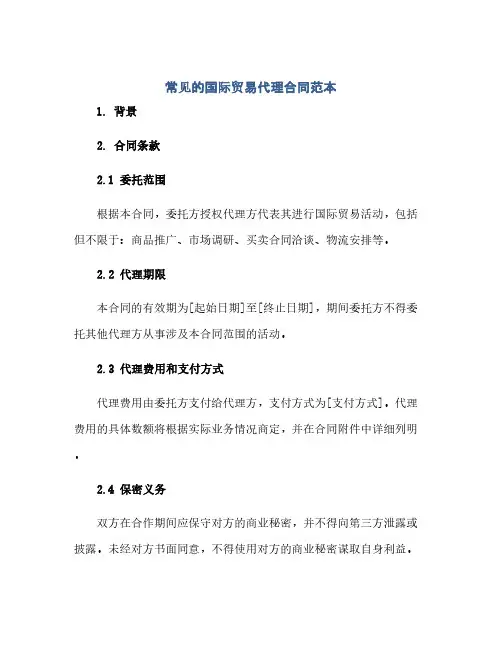
常见的国际贸易代理合同范本
1. 背景
2. 合同条款
2.1 委托范围
根据本合同,委托方授权代理方代表其进行国际贸易活动,包括但不限于:商品推广、市场调研、买卖合同洽谈、物流安排等。
2.2 代理期限
本合同的有效期为[起始日期]至[终止日期],期间委托方不得委托其他代理方从事涉及本合同范围的活动。
2.3 代理费用和支付方式
代理费用由委托方支付给代理方,支付方式为[支付方式]。
代理费用的具体数额将根据实际业务情况商定,并在合同附件中详细列明。
2.4 保密义务
双方在合作期间应保守对方的商业秘密,并不得向第三方泄露或披露。
未经对方书面同意,不得使用对方的商业秘密谋取自身利益。
2.5 不可抗力
如因不可抗力导致一方不能履行合同义务,将免除责任。
不可抗力事件包括但不限于:自然灾害、战争、政府行为、法律法规变更等。
2.6 争议解决
本合同的解释和争议解决适用于[相关法律法规]。
如双方发生争议,应友好协商解决;如协商不成,双方同意将争议提交[仲裁机构]仲裁。
2.7 合同终止
•达到合同期限;
•双方协商一致解除合同;
•发生不能克服的合同纠纷。
3. 其他条款
本合同的补充和变更应经双方书面协商一致,并签署补充协议。
4. 合同生效
本合同一式两份,双方各执一份具有同等法律效力。
合同自双方签字盖章之日起生效。
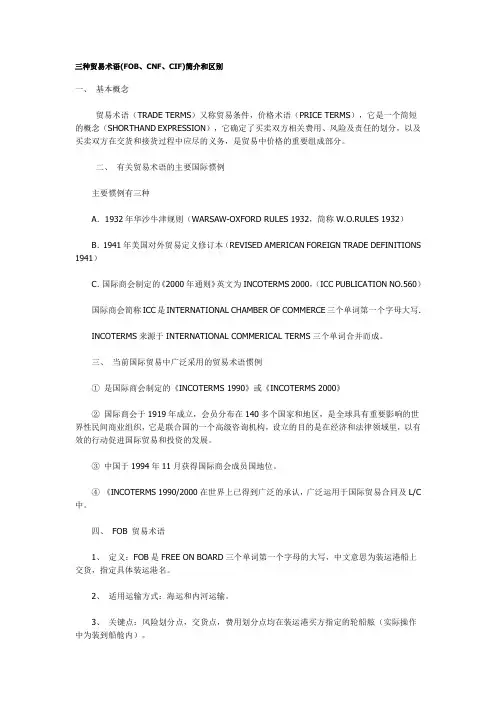
三种贸易术语(FOB、CNF、CIF)简介和区别一、基本概念贸易术语(TRADE TERMS)又称贸易条件,价格术语(PRICE TERMS),它是一个简短的概念(SHORTHAND EXPRESSION),它确定了买卖双方相关费用、风险及责任的划分,以及买卖双方在交货和接货过程中应尽的义务,是贸易中价格的重要组成部分。
二、有关贸易术语的主要国际惯例主要惯例有三种A.1932年华沙牛津规则(WARSAW-OXFORD RULES 1932,简称W.O.RULES 1932)B.1941年美国对外贸易定义修订本(REVISED AMERICAN FOREIGN TRADE DEFINITIONS 1941)C.国际商会制定的《2000年通则》英文为INCOTERMS 2000,(ICC PUBLICATION NO.560)国际商会简称ICC是INTERNATIONAL CHAMBER OF COMMERCE三个单词第一个字母大写.INCOTERMS来源于INTERNATIONAL COMMERICAL TERMS三个单词合并而成。
三、当前国际贸易中广泛采用的贸易术语惯例①是国际商会制定的《INCOTERMS 1990》或《INCOTERMS 2000》②国际商会于1919年成立,会员分布在140多个国家和地区,是全球具有重要影响的世界性民间商业组织,它是联合国的一个高级咨询机构,设立的目的是在经济和法律领域里,以有效的行动促进国际贸易和投资的发展。
③中国于1994年11月获得国际商会成员国地位。
④《INCOTERMS 1990/2000在世界上已得到广泛的承认,广泛运用于国际贸易合同及L/C 中。
四、FOB 贸易术语1、定义:FOB是FREE ON BOARD三个单词第一个字母的大写,中文意思为装运港船上交货,指定具体装运港名。
2、适用运输方式:海运和内河运输。
3、关键点:风险划分点,交货点,费用划分点均在装运港买方指定的轮船舷(实际操作中为装到船舱内)。
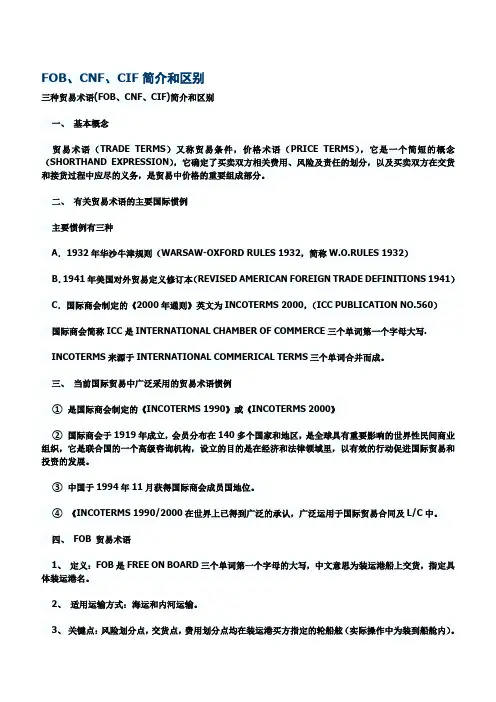
FOB、CNF、CIF简介和区别三种贸易术语(FOB、CNF、CIF)简介和区别一、基本概念贸易术语(TRADE TERMS)又称贸易条件,价格术语(PRICE TERMS),它是一个简短的概念(SHORTHAND EXPRESSION),它确定了买卖双方相关费用、风险及责任的划分,以及买卖双方在交货和接货过程中应尽的义务,是贸易中价格的重要组成部分。
二、有关贸易术语的主要国际惯例主要惯例有三种A.1932年华沙牛津规则(WARSAW-OXFORD RULES 1932,简称W.O.RULES 1932)B.1941年美国对外贸易定义修订本(REVISED AMERICAN FOREIGN TRADE DEFINITIONS 1941)C.国际商会制定的《2000年通则》英文为INCOTERMS 2000,(ICC PUBLICATION NO.560)国际商会简称ICC是INTERNATIONAL CHAMBER OF COMMERCE三个单词第一个字母大写.INCOTERMS来源于INTERNATIONAL COMMERICAL TERMS三个单词合并而成。
三、当前国际贸易中广泛采用的贸易术语惯例①是国际商会制定的《INCOTERMS 1990》或《INCOTERMS 2000》②国际商会于1919年成立,会员分布在140多个国家和地区,是全球具有重要影响的世界性民间商业组织,它是联合国的一个高级咨询机构,设立的目的是在经济和法律领域里,以有效的行动促进国际贸易和投资的发展。
③中国于1994年11月获得国际商会成员国地位。
④《INCOTERMS 1990/2000在世界上已得到广泛的承认,广泛运用于国际贸易合同及L/C中。
四、FOB 贸易术语1、定义:FOB是FREE ON BOARD三个单词第一个字母的大写,中文意思为装运港船上交货,指定具体装运港名。
2、适用运输方式:海运和内河运输。
3、关键点:风险划分点,交货点,费用划分点均在装运港买方指定的轮船舷(实际操作中为装到船舱内)。
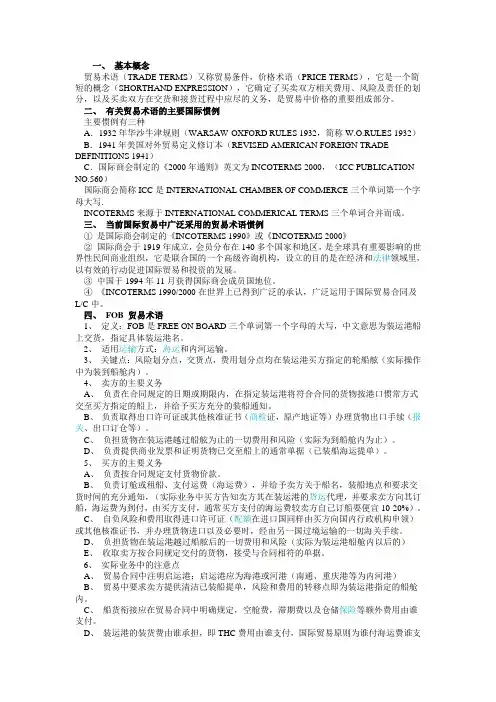
一、基本概念贸易术语(TRADE TERMS)又称贸易条件,价格术语(PRICE TERMS),它是一个简短的概念(SHORTHAND EXPRESSION),它确定了买卖双方相关费用、风险及责任的划分,以及买卖双方在交货和接货过程中应尽的义务,是贸易中价格的重要组成部分。
二、有关贸易术语的主要国际惯例主要惯例有三种A.1932年华沙牛津规则(WARSAW-OXFORD RULES 1932,简称W.O.RULES 1932) B.1941年美国对外贸易定义修订本(REVISED AMERICAN FOREIGN TRADE DEFINITIONS 1941)C.国际商会制定的《2000年通则》英文为INCOTERMS 2000,(ICC PUBLICATION NO.560)国际商会简称ICC是INTERNATIONAL CHAMBER OF COMMERCE三个单词第一个字母大写.INCOTERMS来源于INTERNATIONAL COMMERICAL TERMS三个单词合并而成。
三、当前国际贸易中广泛采用的贸易术语惯例①是国际商会制定的《INCOTERMS 1990》或《INCOTERMS 2000》②国际商会于1919年成立,会员分布在140多个国家和地区,是全球具有重要影响的世界性民间商业组织,它是联合国的一个高级咨询机构,设立的目的是在经济和法律领域里,以有效的行动促进国际贸易和投资的发展。
③中国于1994年11月获得国际商会成员国地位。
④《INCOTERMS 1990/2000在世界上已得到广泛的承认,广泛运用于国际贸易合同及L/C中。
四、FOB 贸易术语1、定义:FOB是FREE ON BOARD三个单词第一个字母的大写,中文意思为装运港船上交货,指定具体装运港名。
2、适用运输方式:海运和内河运输。
3、关键点:风险划分点,交货点,费用划分点均在装运港买方指定的轮船舷(实际操作中为装到船舱内)。
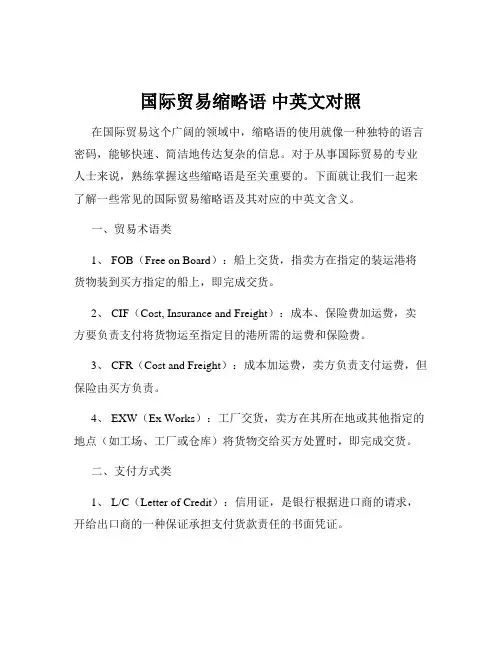
国际贸易缩略语中英文对照在国际贸易这个广阔的领域中,缩略语的使用就像一种独特的语言密码,能够快速、简洁地传达复杂的信息。
对于从事国际贸易的专业人士来说,熟练掌握这些缩略语是至关重要的。
下面就让我们一起来了解一些常见的国际贸易缩略语及其对应的中英文含义。
一、贸易术语类1、 FOB(Free on Board):船上交货,指卖方在指定的装运港将货物装到买方指定的船上,即完成交货。
2、 CIF(Cost, Insurance and Freight):成本、保险费加运费,卖方要负责支付将货物运至指定目的港所需的运费和保险费。
3、 CFR(Cost and Freight):成本加运费,卖方负责支付运费,但保险由买方负责。
4、 EXW(Ex Works):工厂交货,卖方在其所在地或其他指定的地点(如工场、工厂或仓库)将货物交给买方处置时,即完成交货。
二、支付方式类1、 L/C(Letter of Credit):信用证,是银行根据进口商的请求,开给出口商的一种保证承担支付货款责任的书面凭证。
2、T/T(Telegraphic Transfer):电汇,是汇出行应汇款人的申请,拍发加押电报或电传或 SWIFT 给在另一国家的分行或代理行(即汇入行)指示解付一定金额给收款人的一种汇款方式。
3、 D/P(Documents against Payment):付款交单,是指出口人的交单是以进口人的付款为条件。
4、 D/A(Documents against Acceptance):承兑交单,是指出口人的交单以进口人在汇票上承兑为条件。
三、运输与物流类1、 B/L(Bill of Lading):提单,是指用以证明海上货物运输合同和货物已经由承运人接收或者装船,以及承运人保证据以交付货物的单证。
2、 AWB(Air Waybill):航空运单,是指承运人与托运人之间签订的运输合同,也是承运人或其代理人签发的货物收据。
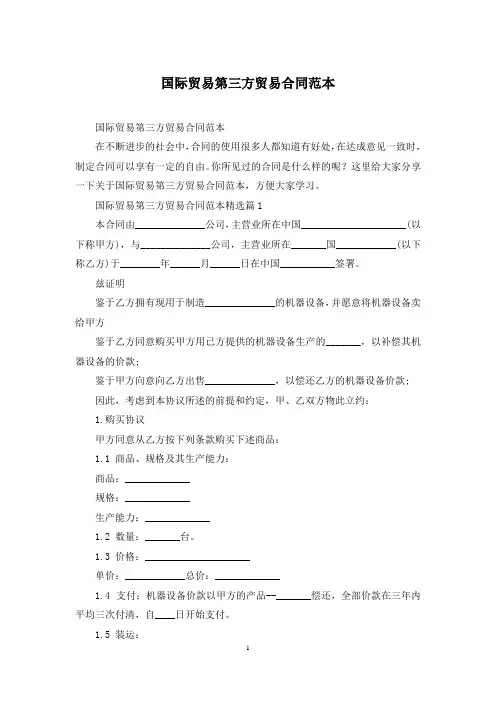
国际贸易第三方贸易合同范本国际贸易第三方贸易合同范本在不断进步的社会中,合同的使用很多人都知道有好处,在达成意见一致时,制定合同可以享有一定的自由。
你所见过的合同是什么样的呢?这里给大家分享一下关于国际贸易第三方贸易合同范本,方便大家学习。
国际贸易第三方贸易合同范本精选篇1本合同由______________公司,主营业所在中国_____________________(以下称甲方),与______________公司,主营业所在_______国____________(以下称乙方)于________年______月______日在中国___________签署。
兹证明鉴于乙方拥有现用于制造______________的机器设备,并愿意将机器设备卖给甲方鉴于乙方同意购买甲方用已方提供的机器设备生产的_______,以补偿其机器设备的价款;鉴于甲方向意向乙方出售______________,以偿还乙方的机器设备价款;因此,考虑到本协议所述的前提和约定,甲、乙双方物此立约:1.购买协议甲方同意从乙方按下列条款购买下述商品:1.1 商品、规格及其生产能力:商品:_____________规格:_____________生产能力:_____________1.2 数量:_______台。
1.3 价格:_____________________单价:____________总价:_____________1.4 支付:机器设备价款以甲方的产品--_______偿还,全部价款在三年内平均三次付清,自____日开始支付。
1.5 装运:装运期:_____________装运港:_____________目的港:_____________装运唛头:_____________1.6 保险:由甲方保险。
1.7 检验:_____________1.8 保证:乙方保证其机器设备从未用这,性能先进,质量好,并保证该机器能生产____规格的______________,产量每小时____。
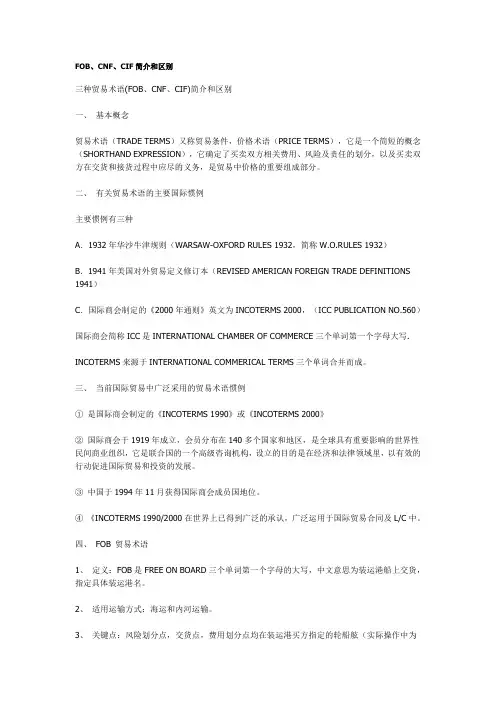
FOB、CNF、CIF简介和区别三种贸易术语(FOB、CNF、CIF)简介和区别一、基本概念贸易术语(TRADE TERMS)又称贸易条件,价格术语(PRICE TERMS),它是一个简短的概念(SHORTHAND EXPRESSION),它确定了买卖双方相关费用、风险及责任的划分,以及买卖双方在交货和接货过程中应尽的义务,是贸易中价格的重要组成部分。
二、有关贸易术语的主要国际惯例主要惯例有三种A.1932年华沙牛津规则(WARSAW-OXFORD RULES 1932,简称W.O.RULES 1932)B.1941年美国对外贸易定义修订本(REVISED AMERICAN FOREIGN TRADE DEFINITIONS 1941)C.国际商会制定的《2000年通则》英文为INCOTERMS 2000,(ICC PUBLICATION NO.560)国际商会简称ICC是INTERNATIONAL CHAMBER OF COMMERCE三个单词第一个字母大写.INCOTERMS来源于INTERNATIONAL COMMERICAL TERMS三个单词合并而成。
三、当前国际贸易中广泛采用的贸易术语惯例①是国际商会制定的《INCOTERMS 1990》或《INCOTERMS 2000》②国际商会于1919年成立,会员分布在140多个国家和地区,是全球具有重要影响的世界性民间商业组织,它是联合国的一个高级咨询机构,设立的目的是在经济和法律领域里,以有效的行动促进国际贸易和投资的发展。
③中国于1994年11月获得国际商会成员国地位。
④《INCOTERMS 1990/2000在世界上已得到广泛的承认,广泛运用于国际贸易合同及L/C中。
四、FOB 贸易术语1、定义:FOB是FREE ON BOARD三个单词第一个字母的大写,中文意思为装运港船上交货,指定具体装运港名。
2、适用运输方式:海运和内河运输。
3、关键点:风险划分点,交货点,费用划分点均在装运港买方指定的轮船舷(实际操作中为装到船舱内)。
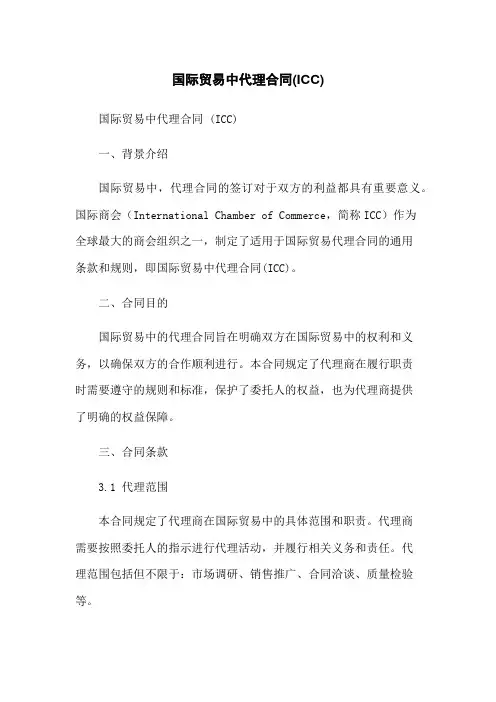
国际贸易中代理合同(ICC)国际贸易中代理合同 (ICC)一、背景介绍国际贸易中,代理合同的签订对于双方的利益都具有重要意义。
国际商会(International Chamber of Commerce,简称ICC)作为全球最大的商会组织之一,制定了适用于国际贸易代理合同的通用条款和规则,即国际贸易中代理合同(ICC)。
二、合同目的国际贸易中的代理合同旨在明确双方在国际贸易中的权利和义务,以确保双方的合作顺利进行。
本合同规定了代理商在履行职责时需要遵守的规则和标准,保护了委托人的权益,也为代理商提供了明确的权益保障。
三、合同条款3.1 代理范围本合同规定了代理商在国际贸易中的具体范围和职责。
代理商需要按照委托人的指示进行代理活动,并履行相关义务和责任。
代理范围包括但不限于:市场调研、销售推广、合同洽谈、质量检验等。
3.2 合同期限本合同的期限由双方商定,可以是固定期限或无固定期限。
在合同期限届满前,双方需提前协商是否续签。
3.3 委托方权益委托方享有合同生效后的明确权益,包括:代理费用结算、代理区域保护、合同终止时的补偿等。
委托方有权根据代理商履行职责是否符合要求来决定是否终止本合同。
3.4 代理费用代理费用是指代理商根据合同约定从委托方处获得的报酬。
代理费用的支付方式和金额由双方商定,并在合同中明确规定。
3.5 保密义务代理商在履行合同期间需保守委托方的商业秘密和机密信息,并采取必要的措施确保信息的保密性。
3.6 争议解决双方发生争议时,应先通过友好协商解决。
如果协商不成,可以选择将争议提交至国际贸易仲裁机构进行调解或仲裁。
四、合同终止本合同可以因以下原因终止:- a)合同期满;- b)双方达成协议终止;- c)违约行为发生;- d)委托方主动解除合同;- e)法律或法规的规定。
五、免责声明在不可抗力情况下,例如战争、自然灾害等,双方不承担产生的责任。
六、其他事项本合同的其他事项可以由双方根据实际情况进行协商并在合同中明确规定。
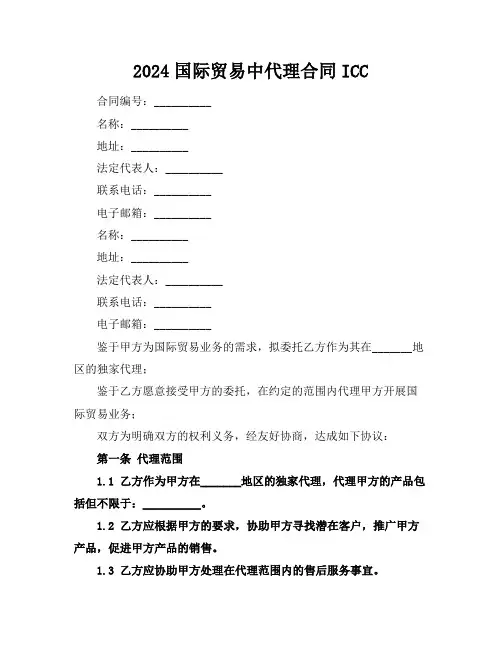
2024国际贸易中代理合同ICC 合同编号:__________名称:__________地址:__________法定代表人:__________联系电话:__________电子邮箱:__________名称:__________地址:__________法定代表人:__________联系电话:__________电子邮箱:__________鉴于甲方为国际贸易业务的需求,拟委托乙方作为其在_______地区的独家代理;鉴于乙方愿意接受甲方的委托,在约定的范围内代理甲方开展国际贸易业务;双方为明确双方的权利义务,经友好协商,达成如下协议:第一条代理范围1.1 乙方作为甲方在_______地区的独家代理,代理甲方的产品包括但不限于:__________。
1.2 乙方应根据甲方的要求,协助甲方寻找潜在客户,推广甲方产品,促进甲方产品的销售。
1.3 乙方应协助甲方处理在代理范围内的售后服务事宜。
第二条代理期限本合同代理期限为______年,自______年______月______日起至______年______月______日止。
第三条代理费用3.1 乙方在代理范围内的销售业绩,应按照双方约定的比例支付代理费用。
3.2 代理费用支付方式为:__________。
第四条甲方的权利和义务4.1 甲方应向乙方提供符合国家标准的产品及服务,并保证产品的质量和安全。
4.2 甲方应提供必要的培训和技术支持,确保乙方能够有效地开展代理业务。
4.3 甲方应对乙方在代理范围内所付出的努力和产生的费用给予合理的补偿。
4.4 甲方不得在代理范围内直接销售产品,不得干涉乙方的正常代理活动。
第五条乙方的权利和义务5.1 乙方应全力以赴地开展代理业务,努力完成甲方的销售目标。
5.2 乙方应按照甲方的要求,进行市场推广和宣传,提高甲方产品的知名度。
5.3 乙方应妥善保管甲方的商业机密,不得泄露给第三方。
5.4 乙方应在代理期限内,持续关注市场动态,及时向甲方反馈市场信息。
国际贸易术语解释通则释义国际贸易术语解释通则释义本文档详细解释了国际贸易中常见的术语,以帮助读者更好地理解和运用这些术语。
文档分为以下几个章节:1.贸易方式与支付方式1.1.发票(Invoice):出卖人向买方提供的详细商品或服务信息的文件。
1.2.信用证(Letter of Credit):买方向银行开立的文件,保证付款给卖方。
1.3.保函(Guarantee):一种金融保证,确保履行合约义务。
1.4.托收(Collection):银行代表买方收取货款。
2.货物运输2.1.装船单据(Bill of Lading):承运人出具的货物装船证明文件。
2.2.提单(Delivery Order):承运人向收货人或其代理人交付货物的命令书。
2.3.运输保险(Transportation Insurance):货物在运输过程中的保险。
3.关税与其他费用3.1.关税(Customs Duty):进口或出口货物时,征收的税费。
3.2.进口税(Import Duty):引入国家的货物需要缴纳的税费。
3.3.出口税(Export Duty):离开国家的货物需要缴纳的税费。
3.4.增值税(Value Added Tax):在商品生产与服务中征税的一种方式。
4.国际贸易条款4.1.国际商会条款(Incoterms):解释商业上国际贸易中的常用术语。
4.2.禁止进口(Prohibited Imports):国家禁止进口的特定货物。
4.3.限制进口(Restricted Imports):国家对进口货物设置限制的规定。
5.贸易争端解决机制5.1.国际商会仲裁(ICC Arbitration):解决国际商业争端的一种方式。
5.2.世界贸易组织(World Trade Organization):负责处理国际贸易争端的国际组织。
附件:本文档附带以下附件供参考:●贸易合同范本●信用证样本●出口报关单样本法律名词及注释:●发票(Invoice):在商业交易中,出卖人向买方提供的详细商品或服务信息的文件。
incoterms的种类国际贸易术语(Incoterms):种类及用途国际贸易术语(Incoterms)是国际商会(ICC)制定的一套全球公认的术语,用于规范国际贸易中的货物买卖合同中关于货物交付、风险转移和费用分摊的条款。
这些术语提供了买卖双方在谈判和执行合同时使用的标准化语言,从而避免因术语理解差异而产生的误解和纠纷。
Incoterms的演变自1936年首次发布以来,Incoterms已经经历了多次修订,以适应不断变化的全球贸易格局。
目前的版本是Incoterms 2020,于2020年9月1日生效。
Incoterms的种类Incoterms 2020共有11种术语,分为两类:A组:运输不支付费用贸易术语EXW(工厂交货):卖家在自己的场所将货物交予买家或买方指定的承运人处。
FCA(承运人处交货):卖家将货物交予买方指定的承运人或其代理人处。
FAS(船边交货):卖家将货物放在指定装运港的船舶旁。
FOB(船上交货):卖家将货物装上指定装运港的船舶上。
B组:运输费用支付贸易术语CFR(成本加运费):卖家将货物运至指定目的港,但风险在装运港转移给买家。
CIF(成本、保险费加运费):与CFR相同,但卖家还负责为货物投保海上运输风险。
CPT(运费已付至):卖家将货物运至指定目的地,但风险在货物交付给第一承运人时转移给买家。
CIP(运费和保险费已付至):与CPT相同,但卖家还负责为货物投保运输风险。
DAP(目的地交货):卖家将货物运至指定目的地,并承担将货物从运输工具卸下的责任。
DPU(目的地卸货):卖家将货物运至指定目的地,并承担将货物从运输工具卸下的责任,但风险在货物到达目的地时转移给买家。
DDP(目的地完税后交货):卖家负责将货物运至指定目的地,并承担所有费用和风险,包括支付进口关税和税款。
选择合适Incoterms术语的因素在选择合适的Incoterms术语时,买卖双方应考虑以下因素:运输方式:货物将通过何种运输方式运输。
20XX 专业合同封面COUNTRACT COVER甲方:XXX乙方:XXX2024国际贸易中代理合同ICC 本合同目录一览第一条:定义与缩略词1.1 定义1.2 缩略词第二条:代理权与职责2.1 代理权2.2 代理职责2.3 代理限制第三条:代理商品与服务3.1 代理商品3.2 代理服务第四条:代理区域4.1 代理区域4.2 代理区域变更第五条:代理期限5.1 代理期限5.2 代理期限延长第六条:佣金与支付方式6.1 佣金比例6.2 佣金支付方式6.3 佣金支付时间第七条:费用与开销7.1 代理商承担费用7.2 委托方承担费用第八条:信息与情报保密8.1 保密信息8.2 保密义务8.3 保密期限第九条:违约责任9.1 违约行为9.2 违约责任第十条:争议解决10.1 争议解决方式10.2 争议解决地点10.3 争议解决机构第十一条:合同的生效、变更与终止11.1 合同生效条件11.2 合同变更11.3 合同终止第十二条:法律适用与管辖12.1 法律适用12.2 管辖法院第十三条:其他条款13.1 通知与送达13.2 合同的完整性与独立性13.3 第三方受益第十四条:附件14.1 附件列表14.2 附件生效条件第一部分:合同如下:第一条:定义与缩略词1.1 定义(1)委托方:指本合同中指定的,委托代理商进行商品或服务代理的一方。
(2)代理商:指本合同中接受委托方委托,负责代理销售商品或提供服务的乙方。
(3)代理商品:指委托方授权代理商进行销售的商品。
(4)代理服务:指委托方授权代理商提供的服务。
(5)代理区域:指委托方授权代理商进行销售或提供服务的区域。
(6)代理期限:指本合同的有效期限。
(7)佣金:指代理商因代理销售商品或提供服务而应得的报酬。
1.2 缩略词(1)ICC:指国际贸易中代理合同国际商会。
(2)甲方:指委托方。
(3)乙方:指代理商。
(4)双方:指委托方和代理商。
第二条:代理权与职责2.1 代理权(1)甲方授权乙方作为其在代理区域的唯一代理商,代理销售甲方指定的代理商品,并提供甲方指定的代理服务。
国际商会ICC国际商会(The International Chamber of Commerce, ICC)成立于1919年,发展至今已拥有来自130多个国家的成员公司和协会,是全球唯一的代表所有企业的权威代言机构。
国际商会是为世界商业服务的非政府间组织,是联合国等政府间组织的咨询机构.国际商会于1919年在美国发起,1920年正式成立.其总部设在法国巴黎。
国际商会以贸易为促进和平、繁荣的强大力量,推行一种开放的国际贸易、投资体系和市场经济。
由于国际商会的成员公司和协会本身从事于国际商业活动,因此它所制定用以规范国际商业合作的规章,如:《托收统一规则》、《跟单信用证统一惯例》、《国际商会2000国际贸易术语解释通则》等被广泛地应用于国际贸易中,并成为国际贸易不可缺少的一部分,国际商会属下的国际仲裁法庭是全球最高的仲裁机构,它为解决国际贸易争议起着重大的作用。
1. 国际商会的性质国际商会是为世界商业服务的非政府间组织,是联合国等政府间组织的咨询机构.国际商会于1 919年在美国发起,1920年正式成立.其总部设在法国巴黎。
国际商会的基本目的是为开放的世界经济服务,坚信国际商业交流将导致更大的繁荣和国家之间的和平。
目前,国际商会的会员已扩展到100多个国家之中,由数万个具有国际影响的商业组织和企业组成,已在59个国家中成立了国家委员会或理事会,组织和协调国家范围内的商业活动。
2.国际商会的职能国际商会主要职能有四个:(1)在国际范围内代表商业界,特别是对联合国和政府专门机构充当商业发言人;(2)促进建立在自由和公正竞争基础上的世界贸易和投资(3)协调统一贸易惯例,并为进出口商制定贸易术语和各种指南(4)为商业提供实际服务.服务包括:设立解决国际商事纠纷的仲裁院、协调和管理货物临时免税进口的ATA单证册制度的国际局、商业法律和实务学会、反海事诈骗的国际海事局、反假冒商标和假冒产品的反假冒情报局、为世界航运创造市场条件的海事合作中心和经常组织举办各种专业讨论会和出版发行种类广泛的出版物。
国际贸易中代理合同(ICC)1. 引言国际贸易中的代理合同是一种经济合作关系,通过该合同,委托人授权代理人代表其进行国际贸易活动。
国际贸易代理合同是由国际商会(ICC)制定的一种国际合同范本,为国际贸易活动提供了一种标准的合同模板。
本文将对国际贸易中代理合同(ICC)进行详细介绍,并对其主要条款进行解析。
2. 合同背景国际贸易中代理合同(ICC)是在国际贸易中委托人和代理人之间达成的一种合作协议。
委托人通过代理合同授权代理人代表其进行国际贸易活动,包括销售、采购和促销等。
代理合同明确规定了委托人和代理人的权利和义务,保障了双方的合法权益。
3. 合同条款国际贸易中代理合同(ICC)通常包含主要条款:3.1 委托与代理此条款详细说明了委托人授权代理人代表其进行国际贸易活动的范围和权限。
委托人可以通过书面方式明确说明代理人的权力,并限定其在特定区域或特定产品上的代理权。
3.2 义务与责任此条款规定了委托人和代理人在国际贸易中的义务和责任。
委托人有义务向代理人提供必要的信息和文件,以便代理人顺利进行代理活动。
代理人有义务按照委托人的要求进行代理工作,并保证其行为符合当地法律法规。
3.3 佣金和费用此条款规定了代理人的佣金和其他费用的支付方式和金额。
佣金通常为以一定比例计算的销售额或利润。
其他费用可以包括代理人在履行合同过程中所发生的运输、保险和报关等费用。
3.4 保密条款此条款要求委托人和代理人在合同期间和合同解除后对双方的商业机密和商业信息予以保密。
双方应采取合理的保密措施,以防止商业机密泄露。
3.5 争议解决此条款规定了双方在合同履行过程中产生的争议解决方式。
通常采用仲裁的方式解决争议,双方可以协商选择一个独立的仲裁机构进行仲裁。
4. 合同有效性与解除国际贸易中代理合同(ICC)的有效性取决于双方是否按照合同条款履行义务。
双方一旦违反合同条款,对方可以提出解除合同的申请。
在解除合同前,双方应尽量通过协商解决争议。
国际贸易中代理合同(ICC)国际贸易中代理合同 (ICC)1. 引言本代理合同(以下简称“合同”)是根据国际贸易惯例和相关法律法规制定的,旨在规范国际贸易中代理关系的权益和责任。
本合同由代理人和委托人双方根据自愿原则达成,并遵守国际贸易中代理合同国际商会(ICC)的相关规定。
2. 定义和解释2.1 代理人:指受委托从事国际贸易活动的个人或组织。
2.2 委托人:指将国际贸易事务交由代理人处理的个人或组织。
2.3 国际商会(ICC):指国际商会是一个由各国工商界组成的国际非政府组织,旨在促进国际贸易和商业发展。
3. 代理范围3.1 代理人应按照委托人的要求,代表委托人进行国际贸易活动。
代理范围包括但不限于商品的采购、销售、物流安排以及相关的报关和支付事宜。
3.2 代理人应以最大善意和专业知识履行代理职责,并保证委托人的利益不受损害。
若代理人在履行职责中出现疏忽、错误或违法行为,应承担相应的责任。
4. 代理费用和结算方式4.1 委托人应根据代理人提供的服务支付合理的代理费用。
代理费用的具体标准和结算方式应在合同中明确约定。
4.2 代理费用的支付方式可以选择银行转账、电子支付或者其他双方商定的方式。
4.3 委托人应及时支付代理费用,并按照约定的时间和方式进行结算。
5. 保密条款5.1 代理人应对委托人提供的商业秘密和机密信息进行保密,并以谨慎和安全的方式处理。
5.2 代理人不得将委托人的商业秘密和机密信息泄露给任何第三方,除非经过委托人的书面许可或法律法规的规定。
5.3 代理人应采取合理的措施保护委托人的商业秘密和机密信息,包括但不限于加密、密码保护和网络安全措施。
6. 争议解决6.1 对于因本合同引起的争议,双方应先通过友好协商解决。
如果协商未能达成一致,双方同意将争议提交国际商会(ICC)进行调解。
6.2 如果通过调解仍然不能解决争议,双方同意将争议提交至合同签订地的仲裁机构进行仲裁。
7. 适用法律和管辖7.1 本合同的签订、生效、履行和解释适用于签订地的法律。
MODEL FORM OF AGENCY CONTRACT FOR INTERNATIONAL TRADE1. A uniform model form for international tradeWhen negotiating agency agreements abroad, one of the main difficulties which parties engaged in international trade are faced with is the lack of uniform rules for agreements of this type. Since there is no internationally agreed uniform legislation on the subject (unlike for example in the case of the international sales contracts), parties must rely on national laws on agency which: (i) do not take into account the specific needs of international trade (since they have been enacted in primis for the domestic agreements, and (ii) substantially differ from one country to another.In particular the Hague Conventions of 1964 and, more recently, the Vienna Convention on the International Sales of Goods of 1980. There is now, to a certain extent, a tendency towards harmonization of national laws, at least within the EEC, in particular on the basis of EEC Directive n°86/653 of 18 December 1986. However, such harmonization is slow and covers only certain aspects of the contract; whilst it is certainly useful in order to create common ground for the basic principles of agencies, it is insufficient to grant legal security in international transactions.Moreover, the directive provides for alternative solutions and leaves Member States free to maintain (or possibly adopt in the future) provisions which derogate to the directive in favor of the agent. Under these conditions the ICC believes there is a need for uniform contractual rules, which are, not based on any specific national law, but which incorporate the prevailing practice in international trade as well as the principles generally recognized by the domestic laws on agency. In preparing this model form, the working group has tried to find fair and balanced solutions to the main problems arising from an agency relationship, in accordance with prevailing legislative standards (and in particular those indicated in the EEC directive). However, since it is impossible to make uniform rules and, at the same time, to respect every rule of the various national laws (which moreover may contradict themselves), the model form may contain some clauses which are not in accordance with specific mandatory provisions of a particular legal system. However, since it is in line with the basic principles of domestic agency laws, the risk of conflict with national public provisions (and in particular with domestic rules which would remain applicable whatever the law applicable to the contract) should be almost non-existent; in any event, in order to cover exceptional situations of this kind, it is expressly stated that, if a conflict with rules of the country of the agent a rises, the latter provisions should in any case be considered by the arbitrators, if their application appears reasonable in the context of international trade (art. 23.3).2. Provisions on indemnity.There are provisions in a certain number of countries which grant the agent an indemnity if the contract expires or is terminated for reasons other than a default attributable to the agent. Such "indemnity" may be construed as a compensation for goodwill created by the agent and which accrues to the principal after the end of the contract, or as acompensation for the loss suffered by the agent (e.g. the commissions he would have earned had the contract lasted for a longer period or the investments he would have amortized if the contract had not been terminated) as a consequence of the expiration or termination of the contract. This idea characterizes e.g. German, Swiss and Dutch law. Under the French system: see notably article 3 of the Decree of 23 December 1958 "lagent commercial a drot a la reparation du prejudice oue lui cause la cessation de ses relations avec le commettant" These two solutions have been incorporated (as alternatives) in article 17.2 and 17.3 of the EEC Directive. In fact they have the same purpose, i.e. to compensate the agent for the loss of goodwill when the contract is terminated without his fault: we will hereafter refer to the above indemnity or compensation as "goodwill indemnity". On the other side, there are many countries where no right to a goodwill indemnity is granted to the agent.This does not exclude of course that the agent may be entitled to compensation for damages suffered as a consequence of a contract termination which amounts to a breach of the contract by the principal. Under these conditions it appears appropriate to give the parties the opportunity to choose if they wish to include or not the indemnity provision in their contract. For this purpose, article 21 provides two alternatives (A and B) in order to cover the different situations. It is strongly recommended to choose alternative A whenever the right to indemnity is recognized by the law of the agent's country; in particular, as concerns EEC countries, alternative A of article 21 would conflict with mandatory rules of the legislation of the agent's place of business. Furthermore, in cases where no such legislation exists, it may be fair to grant the indemnity, particularly if this conforms with international trading practice in that particular business and/or area. As concerns the system of indemnification, the model form has incorporated the principles contained in article 17.2 of the EEC directive, i.e. the "German" system, which appears to be prevailing in the countries which recognize the indemnity. 6 This means that the indemnity system of the model form is not in strict compliance with the laws of the countries (like France) which follow the alternative solution set forth in article 17.3 of the EEC directive. However, since the substance of the agent's rights is recognized, this should not give rise to particular problems.3. Recourse to international arbitrationSince the model form is a set of uniform contractual rules, avoiding (as far as possible) the direct application of conflicting domestic legislation, it is appropriate that possible disputes be solved by a uniform resolution system, organized on an international level. From this point of view the best solution appears to be international commercial arbitration (see particularly art. 23), which permits a truly international approach and avoids the risk of differentiation which would arise in case of recourse to domestic courts. Since arbitration is essential in the framework of this model, this ICC model contract should not be used in cases where the dispute may be considered as non-arbitrable (i.e. "capable of settlement by arbitration") according to the New York Convention of 1958. The above risk exists in particular under national laws which assimilate agents to employees (see hereunder, §4.2.), whenever this implies a special jurisdiction for disputes of this type. In thesesituations it is normally recommended to contract with agents who are legal persons (see hereafter, §4.2.) E.g. for the V.R.P. (France) and the Representants de commerce (Belgium) or for agents acting mainly with personal resources (Italy). In all these cases the national law provides an exclusive jurisdiction (specialized in labor disputes) which cannot be excluded by an arbitration clause.4. Scope of applicationThis model form has been prepared on the assumption that it would apply only to international agency agreements, with self-employed commercial agents, acting for the sale of goods.4.1. International agreementsIn this respect it is undisputable that international agency agreements should be governed by special rules in order to take into account the special situation which exists in an agency agreement between parties of two different countries. Since the present model form has been established especially for these situations, it will, in principle, not be appropriate for domestic contracts, i.e. contracts between parties having their place of business in the same country. The parties are therefore advised not to use this model form for domestic contracts, unless they check which amendments are necessary in order to comply with a local situation.4.2. Contracts with employed agentsIn several countries special rules govern contracts with agents qualified as employees, or more generally with agents assimilated to the status of employees. E.g. in France, with regard to VRP (Voyageurs, representants placiers), and in Belgium for "representants de commerce". The above rules establish a presumption that the agent is an employee: thus, even if the contract clearly states that the agent is independent, he will in principle be considered to be an employee. In the Netherlands, labor law may apply to the so-called Einfirmenvertreter, i.e. agents which represent only one principal. E.g. in Italy the special procedural rules (which exclude inter alia recourse to arbitration) which govern employment contracts also apply to agency contracts, in all cases where the agent has no important organization of his own, but is acting mainly with his own family and personal resources.In countries of the above type there is a risk that the agent may be qualified (independently of the definition given in the contract) as an employee and that consequently the rules applicable to employed agents (which will in many cases conflict with the provisions of this model form) will apply. A simple way to avoid such problems, particularly in the context of this model form, could be to contract with agents who are legal persons (e.g. companies): this solution is especially recommended when the agent is established in a country where a wide notion of employed agents (or agents assimilated to employed agents) is accepted by the law or jurisprudence. Since it is normally admitted that a legal entity cannot, by definition, be considered as an employee.4.3. Buying agentsThis model is meant for agents who represent a seller of goods, without taking into account so-called "buying agents" (i.e. agents who promote the purchase of goods, acting for the buyer).4.4. "Service" agentsThe model form has only taken into account the most common case of agents selling goods, without considering agents concerned with the promotion of services.4.5. Consignment of the goodsIt happens frequently that the principal wishes to appoint the agent as consignee of a stock of goods (or spare parts) placed in the agent's country. This involves however a number of special problems which should be dealt with in a separate contract. Consequently the problems of consignment of goods have not been considered in this model form.5. Precautions for use of the model formAny model contract should, to the extent possible, be adapted to the circumstances of a specific case. Of course, in theory the best solution consists in drafting an individual contract based on existing model forms in order to take account of all the specific requirements of the parties. However, the parties are often not in a position to prepare a specific contract and prefer to have recourse to a ready-to-use balanced model form: in this case they will ask for a model which can be used as it stands, without any need to make modifications or additions. The present model is an attempt to achieve a balance between these two possibilities. The ICC has tried to work out a single solution on every issue. However, where this has not been possible (see e.g. articles 8 and 18 and 21), alternatives have been suggested. Such alternative solutions have been presented side-by-side under the letters A and B, in order to point out that only one of them can apply. Therefore, before signing the contract, the parties must decide which of the alternative solutions they choose, and then cancel the alternative they do not want to apply. In any event, the model form provides that, if the parties do not make a choice by canceling one alternative, one of them will automatically apply according to article 24.1. and 24.2. of the model form.) There are also a number of points where the parties must fill in their requirements: definition of the territory and the products, amount of commission, etc. All such points have been put in the annexes to this document, so that the parties can fill in and (where necessary) modify such annexes during the life of the contract, without making changes to the basic text of the contract. Before signing the contract the parties should (and must as far as Annex VI is concerned) fill in the Annexes and, if appropriate, delete the parts they do not need. In order to avoid misunderstandings the parties should, when signing the contract, put their initials on each page, in order to make sure which amendments they have agreed upon or which alternative solutions they have chosen. The Annexes have been construed throughout so that (except for Annex VI regarding commission) even when the parties do not fill in some points, a solution can be found within the contract.MODEL FORM OF INTERNATIONAL AGENCY CONTRACT(ICC COMMERCIAL AGENCY CONTRACT)Between________________________________________________________________ whose registered office is at______________________(hereinafter called "the Principal") and___________________________________________________________________ whose registered office at__________________________(hereinafter called "the Agent")IT IS AGREED AS FOLLOWSArt. 1 Territory and Products1.1. The Principal appoints the Agent, who accepts, as his commercial agent to promote the sale of the products listed in Annex 1, §1 (hereinafter called "the Products") in the territory defined in Annex 1, §2 (hereinafter called "the Territory").1.2. If the Principal decides to sell any other products in the T erritory, he shall inform the Agent in order to discuss the possibility of including them within the Products defined under article 1.1. However, the above obligation to inform the Agent does not apply if, in consideration of the characteristics of the new products and the specialization of the Agent, it is unreasonable to expect that such products may be represented by the Agent (e.g. products of a completely different range).Art. 2 Good faith and fair dealing2.1. In carrying out their obligations under this agreement the parties will act in accordance with good faith and fair dealing.2.2. The provisions of this agreement, as well as any statements made by the parties in connection with this agency relationship, shall be interpreted in good faith.Art. 3 Agent's functions3.1. The Agent agrees to use his best endeavours to promote the sale of the Products in the Territory in accordance with the Principal's reasonable instructions and shall protect the Principal's interests with the diligence of a responsible businessman.3.2. The Agent shall not solicit orders from outside the Territory unless permitted to do so by the Principal. Where the Agent negotiates with customers in the Territory business which results in contracts of sale with customers established outside the Territory11, article 15.2. shall apply. E.g. for goods to be sold to subsidiary established in another country: the agent is acting within his territory, hat the sale is made to a foreign customer, and the agent would have (in absence of article 15.2) no right to commission.3.3. Unless otherwise specifically agreed, the Agent has no authority to make contracts on behalf of, or in any way to bind the Principal towards third parties. He only solicits orders from customers for the Principal, who is free (save as set forth in article4.2. hereafter) to accept or to reject them. The other alternative, i.e. to give the agent the authority to conclude contracts on behalf of the principal has not been considered in the model form, since it is rather uncommon in international trade. Of course, if the parties have specialreasons for permitting the agent to make contracts on behalf of the principal, they can so provide in article 3.3. It should be noted that in certain cases the third party (customer) may rely on the apparent authority of the agent this means that, especially in legal systems where it is common that the agent is authorized to act on behave of the principal, the exclusion of any such authority provided for in the contract between principal and agent (like art. 3.3. of this model form) does not necessarily bind a third party which had good reasons to rely on the apparent authority of the agent. It is, therefore, recommended that the principal avoids any action which may give third parties the impression that the agent has representative powers, and that he informs, if necessary and possible, third parties that the agent has no authority to bind the principal.3.4. When negotiating with customers, the Agent shall offer Products strictly in accordance with the terms and conditions of the contract of sale which the Principal has communicated to him. This is to ensure that orders by the customers conform to the Principals terms and conditions (e.g. prices, delivery terms, etc.): if this is not the case (because the agent has given incorrect information to the prospective customer) the principal will be in an embarrassing situation (at least from the commercial point of view) if the refuses the order.3.5. The Agent is not entitled to receive payments on the Principal's behalf without prior written authorization from the Principal to that effect. When the Agent has been so authorized, he must transmit them as soon as possible to the Principal and until then hold them separately on deposit on the Principal's behalf.Art. 4 Acceptance of orders by the Principal4.1. The Principal shall inform the Agent without undue delay of his acceptance or rejection of the orders transmitted by the latter. The Principal may accept or reject any individual order transmitted by the Agent at his own discretion.4.2. The Principal may not however unreasonably reject the orders transmitted by the Agent. In particular, a repeated refusal of orders contrary to good faith (e.g. if made for the only purpose of hindering the Agent's activity) shall be considered as a breach of contract by the Principal.Art. 5 Undertaking not to compete5.1. Without the prior written authorization of the Principal, the Agent shall not represent, manufacture or distribute any products which are in competition with the Products, for the entire term of this contract.5.2. The Agent may represent, distribute or manufacture any products which are not competitive with the Products, provided he informs the Principal in advance of such activity. However, the above obligation to inform the Principal does not apply if, in consideration: (i) of the characteristics of the products which the Agent wants to represent, and (ii) of the field of activity of the principal for whom the Agent wishes to act, it is unreasonable to expect that the Principal's interests may be affected.5.3. The Agent shall refrain from representing or distributing non-competitive products of a manufacturer who is a competitor of the Principal, if requested to do so by the Principal, provided the latter's request is reasonable, taking into account all the circumstances of thecase. E.g. if there are reasons to fear that the collaboration with a competitor may impair the confidence between the parties or the protection of confidential information.5.4. The Agent declares that he represents (and/or distributes or manufactures, directly or indirectly) the products listed in Annex II on the date on which this contract is signed.Art. 6 Sales organization, Advertising and Fairs6.1. The Agent shall provide an adequate organization for sales and, where appropriate, after-sale service, with all necessary means and personnel, in order to ensure the fulfillment of his obligations throughout the Territory under this agreement.6.2. The parties may agree on the advertising to be jointly made in the Territory. The contents of any advertising must be approved by the Principal. The cost of advertising carried out by the Agent shall be apportioned between the parties as indicated in Annex III, §1.6.3. The parties shall agree on their participation in fairs or exhibitions within the Territory. The cost of the Agent's participation in such fairs and exhibitions shall be apportioned between the parties as indicated in Annex III, §2.Art. 7 Sales Targets-Guaranteed Minimum TargetA distinction is made between a "sales target" (7.1., 7.2.) the non-attainment of which does not, in principle, involve a contract breach, and o "guaranteed minimum target" (7.3.), which implies a possible contract termination (or other consequences) in case of non-attainment. If the parties wish to agree upon such "guaranteed minimum target", they must fill in Annex IV.7.1. The parties may agree annually on the sales targets for the forthcoming year.7.2. The parties shall make their best efforts to attain the targets agreed upon but the non attainment shall not be considered as a breach of the contract by a party, unless that party is clearly at fault.7.3. In Annex IV the parties may agree on a Guaranteed Minimum Target and on the consequences of its non-attainment.Art 8 Sub-agents(In certain circumstances it may be advisable to add a clause providing that each party agrees not to engage subagents and/or employees of the other party. )The Agent may engage sub-agent. The Agent must carry out agents, provided he informs his activity without recourse the Principal at least one month before the engagement to sub-agents. The Agent shall be responsible for the activities of his subagents.Art. 9 Principal to be kept informed9.1. The Agent shall exercise due diligence to keep the Principal informed about his activities, market conditions and the state of competition within the Territory. He shall answer any reasonable request for information made by the Principal.9.2. The Agent shall exercise due diligence to keep the Principal informed about: (i) the laws and regulations which are to apply in the Territory to which the Products must conform (e.g. import regulations, labeling, technical specifications, safety requirements,etc.), and (ii) the laws and regulations concerning his activity, as far as that they are relevant for the Principal.Art. 10 Financial responsibility10.1. The Agent shall satisfy himself, with due diligence, of the solvency of customers whose orders he transmits to the Principal. He shall not transmit orders from customers of which he knows or ought to know that they are in a critical financial position, without informing the Principal in advance of such fact.10.2. The Agent shall act as a del credere agent only if, and to the extent, the parties have expressly agreed thereto. In that case they should complete and sign Annex V.Art. 11 Principal's trademarks and symbols11.1. The Agent shall use the Principal's trademarks, trade names or any other symbols, but for the only purpose of identifying and advertising the Products, within the scope of this contract and in the Principal's sole interest.11.2. The Agent hereby agrees neither to register, nor to have registered, any trademarks, trade names or symbols of the Principal (or which are confusingly similar with the Principal's ones), in the Territory or elsewhere.11.3. The right to use the Principal's trademarks, trade names or symbols, as provided for under the first paragraph of this article, shall cease immediately for the Agent, on the expiration or termination, for any reason, of the present contract.11.4. The Agent shall notify the Principal of any infringement of the Principal's trademarks, trade names or symbols that comes to his notice.Art. 12 Complaints by CustomersThe Agent shall immediately inform the Principal of any observations or complaints received from customers in respect of the Products. The parties hereto shall deal promptly and properly with such complaints. The Agent has no authority to engage in any way the Principal, unless after he has received a specific authorization to such effect.Art. 13 Exclusivity13.1. The Principal shall not, during the life of this contract, grant any other person or undertaking within the Territory the right to represent or sell the Products.13.2. The Principal is however entitled to deal directly, without the Agent's intervention (provided he informs the latter) with customers situated in the Territory; in respect of any sales arising therefrom, the Agent shall be entitled to the commission provided for in this contract.13.3. The Principal shall be entitled to deal directly with the special customers listed in Annex VI, §2; in respect of the sales to such customers the Agent shall be entitled to the reduced commission provided for in Annex VI, §2. Paragraph 13.3. shall not apply if §2 of Annex VI (Special customers/Reduced commission) has not been filled in by the parties.Art. 14 Agent to be kept informed14.1. The Principal shall provide the Agent with all necessary written information relatingto the Products (such as price lists, brochures, etc.) as well as with the information needed by the Agent for carrying out his obligations under the contract.14.2. He shall furthermore inform the Agent without undue delay of his acceptance, refusal and/or non-execution of any business transmitted by the Agent.14.3. The Principal shall keep the Agent informed of any relevant communication with customers in the Territory.14.4. If the Principal expects that his capacity of supply will be significantly lower than that which the Agent could normally expect, he will inform the Agent within a reasonable time.Art. 15 Agent's commission15.1. The Agent is entitled to the commission provided for in Annex VI, §1, on all sales of the Products which are made during the life of this contract to customers established in the Territory.15.2. If the Agent, when dealing with customers established in the Territory, solicits orders resulting in contracts of sale with customers established outside the T erritory, and if the Principal accepts such orders, the Agent shall be entitled to receive a reduced commission, the amount of which shall be decided on a case by case basis. Similarly, the Agent's commission shall be reduced when an other agent solicits orders with customers established outside the Territory resulting in contracts of sale with customers established within the Territory.15.3. A reduced commission may be agreed in advance between the Principal and the Agent in appropriate circumstances where a customer is to be granted terms or conditions which are more favorable than the Principal's standard conditions. If the parties have filled in §3 of Annex, VI the figures indicated therein shall apply in the respective situations. 15.4. Unless otherwise agreed in writing, the commission covers any expenses incurred by the Agent in fulfilling his obligations under this contract (such as telephone, telex, office, travel expenses, etc.)Art. 16 Method of calculation commission and payment16.1. Commission shall be calculated on the net amount of the involves, i.e. on the effective sales price (any discount other than cash discounts being deducted) clear of any additional charges (such as packing, transportation, insurance) and clear of all tariffs or taxes (including value added tax) of any kind, provided that such additional charges, tariffs and taxes are separately stated in the invoice.16.2. The Agent shall acquire the right to commission after full payment by the customers of the invoiced price. In case of partial payment made in compliance with the sales contract, the Agent shall be entitled to a proportional advance payment. In case the Principal is insured against the risk of non-payment by his customers, the parties may agree that a commission be paid on the sums obtained by the Principal from the insurer, by filling in Annex VI, 4.1.16.3. The Principal shall provide the Agent with a statement of the commissions due in respect of each quarter and shall set out all the business in respect of which such commission is payable. The commission shall be paid not later than the last day of the month following the relevant quarter.。